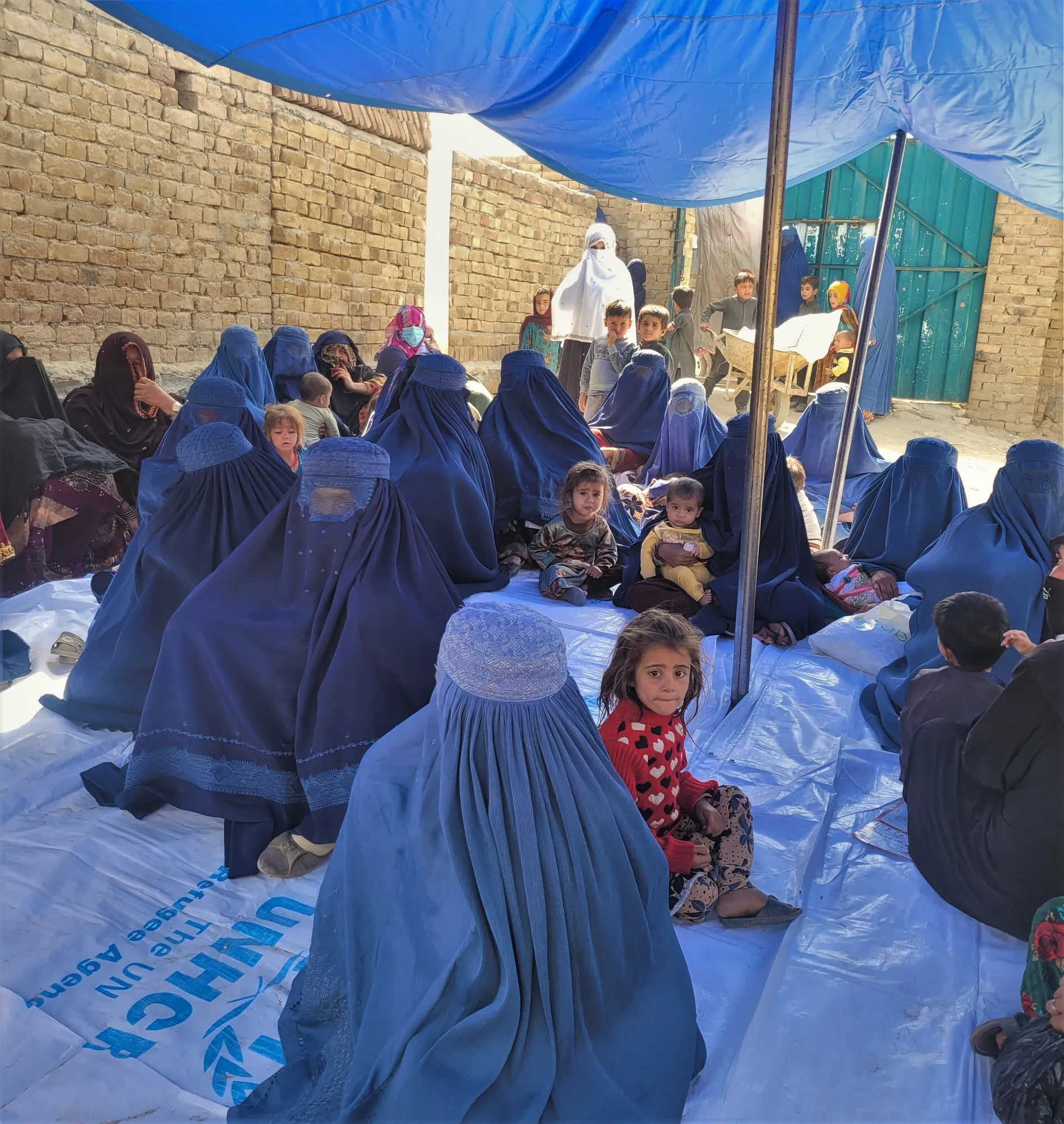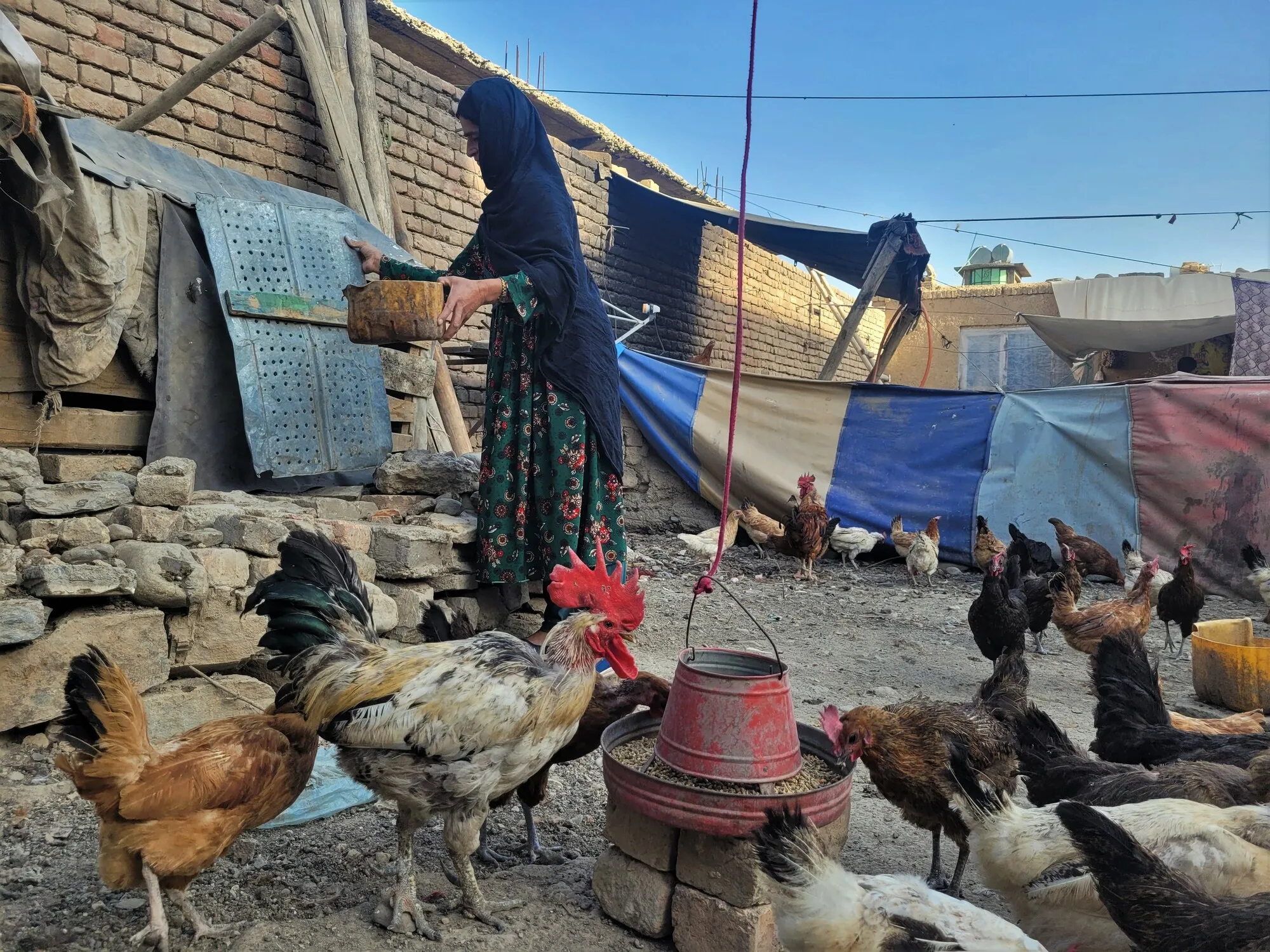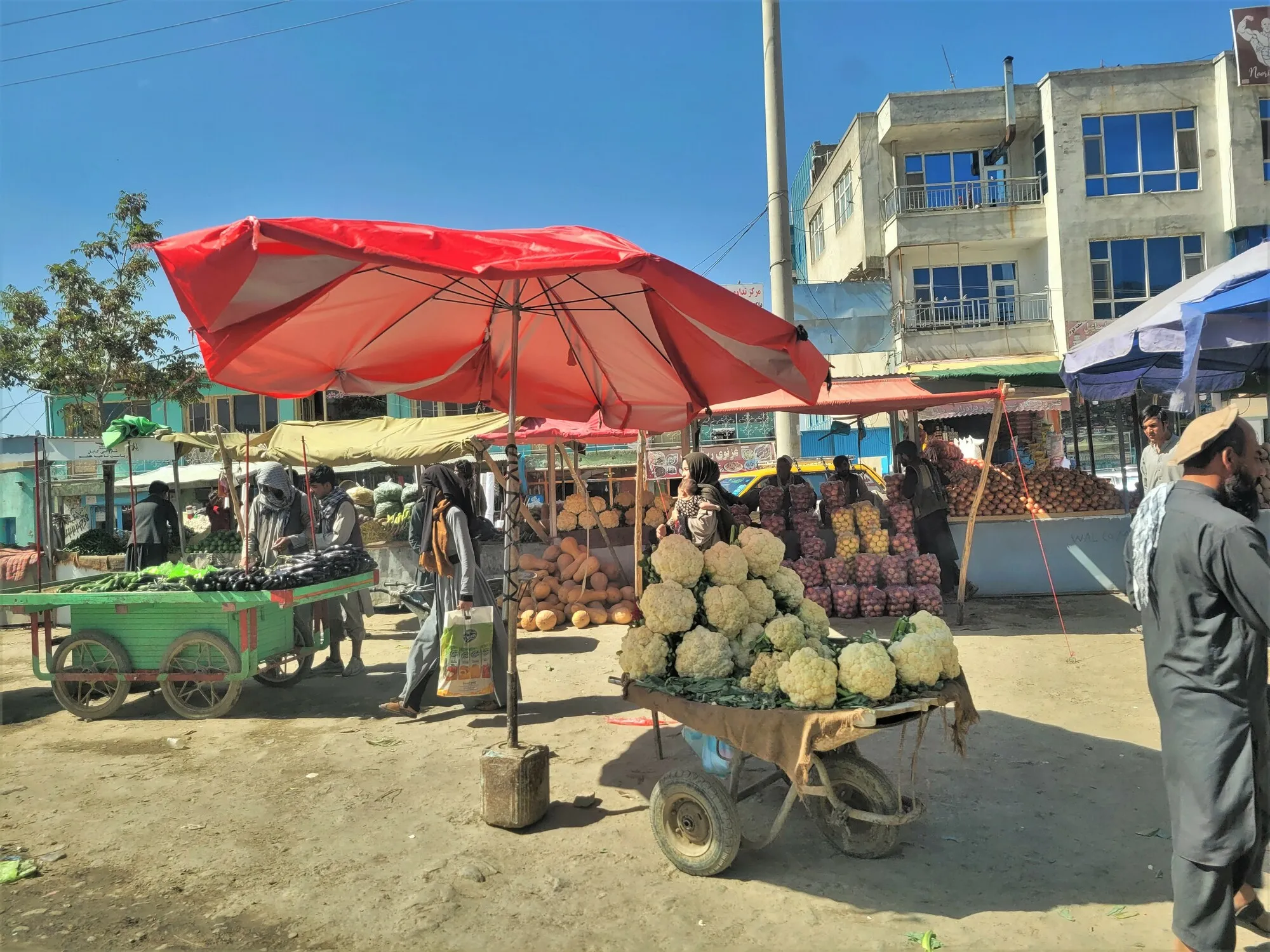Below are three scenes from life in this new Afghanistan, where women and girls are forced to confront disproportionate challenges in the face of hunger, economic upheaval, and restricted access to education.

In a mobile Health Center by CARE outside of Kabul in October 2022. Photo: Sarah Easter/CARE
In a mobile Health Center by CARE outside of Kabul in October 2022. Photo: Sarah Easter/CARE
Below are three scenes from life in this new Afghanistan, where women and girls are forced to confront disproportionate challenges in the face of hunger, economic upheaval, and restricted access to education.

“We were alone when we left Pakistan to come to Afghanistan,” says Fazil, 60, father of seven.
He is sitting on a brown carpet in front of his house in Kabul, surrounded by his wife, Sherbano, 35, and his four daughters.
“We were living in a camp for internally displaced in Pakistan,” he says. “I had hoped that I could find work in Afghanistan. I was doing some shoe repairs in Pakistan, but I could not find a job here.”

With a huge working-age population in Pakistan, an increasing number of workers are moving to other countries for employment; after India, Pakistan annually sends abroad the second-largest grouping of workers in South Asia, mainly to the Gulf region.
However, in Afghanistan the unemployment rate is the highest it ever has been. In 2021, the unemployment rate surged up to 13.3 percent of the population.
After arriving at a refugee camp in Kabul in 2015, Fazil had to provide for his family.
“I went through the garbage cans to find food.”
“I often went at night and picked up the rubbish from laborers at construction sites,” Fazil remembers. “During the day I went out on the street and begged for food. Anything to feed my family.”
They didn’t cook back then; they just ate what they could find, and, on some days, they did not eat at all.
Today, 95% of the population in Afghanistan is facing food insecurity, even though there is no food shortage. The markets are still full of fruits and vegetables, but many people can’t afford to buy them.
Increasing global energy and food prices, combined with the drought’s impact on agriculture continue to drive inflation in Afghanistan.
In the year after the political change in August of 2021, the price of the food basket had increased by almost 35 percent.
Due to his hypertension, Fazil is nearly completely paralyzed on the left side of his body. His wife Sherbano has already had three surgeries in the last two years.
“The only medicine that I can afford is what is in this bottle,” says Fazil while holding a blue plastic bottle filled with water.
“I blow on it and pray and wish that it will help my wife.”
Last year, the family lost their three-year-old daughter, who suffocated on a bean.
“There has been a lot of tragedy in our life, but now we can continue our life through the support of CARE,” he says.
CARE helped the family by giving them 40 chickens, equipment to feed the chickens, and a coop. The family also received training on how to take care of the little farm they had established.
Now, Sherbano and her daughters sell the eggs from the chickens in the neighborhood and generate income that helps them with their daily expenses.
“I do not have to go begging anymore, and I am very thankful. We can now develop our farm further to save my family,” Fazil says. “We already have 20 new chickens. This is our main source of income.”
“Without this, we do not have anything.”
As Fazil talks, Sherbano enters the chicken coop with a green plastic bowl and starts collecting the eggs. Today, she collects 52 of them.

In a small tent in the courtyard of her home, she puts a metal pan on a small blue gas cooker to start dinner for her family. The eggs are not only used to generate income but also to feed her family.
“Now we can eat twice a day,” Fazil says. “I am very happy that we survived and do not go hungry anymore.”

In front of the school many excited girls are waiting for the gate to open. Many have come very early, even hours before school is supposed to start. Then, a teacher comes out to meet the girls and tells them that they have to go home. They have to go home, because they are girls. Secondary school will not open for girls today.
It is March 23 in Afghanistan.
“I cried every day, after I was told that the schools are still closed. This was a very dark day for girls. At first it was hard for me to believe. I think we were all shocked,” remembers Fatima, 18. She would have been going to 11th grade.
“When I was a little girl in school, I saw girls wearing very nice and special clothes,” says Fatima, sitting next to her sister Zahra on a cushion on the floor in the living room. “I asked my teacher about it, and she told me that they were wearing their graduation clothes.”
“I wanted to know if one day I will also be wearing those clothes and was very happy when she said yes.”
“But I never reached that level.”
She has not been to school for three years now. First due to the COVID-19 pandemic, now the restrictions are depriving a whole generation of women and girls of their right to education.
“I lost my hope. Not being able to go to school has a negative effect on every girl. I feel depressed and mentally stressed. When I look into the future, it is dark. We suffer every day without school. We had ambitions, but now we lost ourselves,” says Fatima.
She wants to be a doctor but given the current restrictions she will not be able to attend university and study to become one.
It’s a tragedy for Fatima, but also for a country with 13.8 million women and girls.
Without adequate medical education for women, there will not be trained female healthcare workers. And without trained female healthcare workers, there will be a lack of female doctors, nurses, midwives, and nutrition counselors.
Culturally, women need female healthcare workers to treat them, because women’s healthcare can’t be done by a man.
Women are already often struggling to access health care due to costs, including for transportation to a health facility, and for medications and supplies for which patients are obliged to pay.
This will only worsen with girls not going to school.
The employment and education bans on women and girls over the past two years have erased earlier progress and heightened their mental health needs. This is significantly slowing the recovery efforts of the country in the short and long-term.

“Now I only have free time. I am very grateful to be able to join CARE’s small savings group. It helps me to stand on my own two feet. I learned how to save money for myself and how to start a business. I do embroidery now and now have a little hope,” explains Fatima while smoothing out the wrinkles in the packaging of her work.
She is holding a piece of linen fabric with flower embroidery, which she wants to sell as a tablecloth.
Women and girls receive training in handicraft skills by CARE, but also on how to save money and how to generate income through business.
Fatima and her sister Zahra, 22, sell their embroidery at the local market. They go and find a small shop owner in between food stalls in the bustling city of Kabul, who might buy their handicrafts.
“I am always scared when we go out to sell our work,” says Zahra because of the security situation in her hometown. Once they find someone who is willing to buy it, they hurry back home.
“It is only a little profit, but it helps our family.”
Zahra and Fatima’s father lost his job a few months ago. He was a driver, and the owner of his rental car needed the car back to sell it, because the economic situation has worsened.
“I am grateful that Fatima helps the family, but I want her to be able to continue her education and fulfill her wishes,” says Zainab, the girls’ mother.
She cried a lot, when she heard the news that Fatima had to stay at home and could not go to school.
“My message to the world is to open the doors to schools again, so girls can reach their hopes and wishes, and we mothers can stop crying.”

The lights suddenly turn off, the humming of the sewing machine dies down, and it is very quiet in Surya Ali’s working station. The traditional Afghan dress with bright colorful stitching is not finished; she still needs to add a whole part. But the only option is to continue by hand.
The capital city of Afghanistan turns the electricity off every day.
“You never know when it is off, or when they will turn it back on again,” says Surya Ali, 39, mother of eight.
Some areas only have power in the mornings, some only for a few hours in the afternoon.
The mother is a tailor and sells her dresses at the local market or to shop owners. “I never received an education, so I taught myself how to sew because when I started there was a good market for these skills and I could support my family,” she says.
But the economic situation only got worse.
“I lost everything because my contract to produce dresses was terminated. So, I started my own business.”
She is self-taught and learned by watching other businesses closely. “I saw other companies have logos, so I applied it to my own business and created a logo for myself.”
CARE supported Surya Ali with two solar-powered sewing machines that she can use even if there’s no electricity flowing to her home.
“I asked if that was possible, because I need to have a way to work with all the power outages,” she explains. With the machines she has increased her production. Before she was able to produce one dress a day, now she makes up to four dresses every day.
“I now have 40 percent more income than I used to have and can support my family,” she says. Her husband lost his government job and is now retired, so it is Surya Ali who sustains her family. However, the economic situation in Afghanistan isn’t getting better.
“Many customers cannot afford to buy dresses,” says Surya. “Before I had 25 employees, but a month ago I had to let nearly all of them go because I could not afford their salaries. Now I only have six employees.”
In addition to her tailoring business, she receives some income from teaching girls how to sew.
“The girls are not allowed to go to school at the moment, so they come here to learn,” she explains.
She says she hopes to have branches of her business in other districts in Afghanistan in the future and even expand to have international exports. “As a woman and mother, I am happy to be able to support my family, to have my own business and to stand on my own two feet,” she says.
One of her students is her own daughter Manucara, 16, who would be going to 10th grade. “She knows how to sew now, I taught her. She even made her first own dresses, which makes me very proud. But I am also sad for her. She wishes to be a doctor but cannot continue her education. We thought it was temporary, but the schools are still closed.”